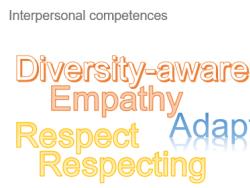European partnership proposes 11 qualifications for LGBTI+ sensitivity for vocational training

26 February 2021 - Today, the SENSE-project published her fourth newsletter. This issue focuses on how the European partnership developed qualification frameworks for students and teachers in vocational education. A key question was: do we need formal and specific LGBTI+ criteria for vocational professional qualifications? Or are general competences enough when applied with adequate sensitivity?
Development
The sense competence framework was developed in 3 phases. The first phase was a brainstorm, which raised 22 possible competences These all were still quite general and not LGBTI+ specific.
The second phase happened during a life project meeting in Città di Castello in early 2020. The partnership discussed the competences in two ways. In the first place the partnership engaged in a selection process to reduce the original number of competences to 11. In the second place the partnership discussed the relationship between generic competences and specific LGBTI+ competences.
In the third phase the partnership worked out the competence document to include concrete suggestions on how to implement the competences in teaching practice. In this phase the partnership decided it would be useful to add competences teachers should have to be able to educate the students in the specific area.
Generic or specific?
Initially, the partnership wondered whether the field of vocational training needs a list of specific competences relating to LGBTI+ issues and concerns. Or should they identify the related generic competences and stress the need to implement them in an inclusive way?
The partnership decided it would be wise to formulate the recommendations for VET qualifications as generic competences. At the same time the partnership wanted to clarify how these core generic competences need to be interpreted when relating to LGBTI+ people. This approach has several advantages. In the first place, it makes clear that treating LGBTI+ students, clients, patients and customers is not special . They should be considered part of the normal required skills of vocational professionals. Vocational professionals have to be sensitive of LGBTI+ needs, but also of immigrant needs, cultural needs, religious needs, needs of disabled people and so on. In the second place, labelling some professional competences as specific for LGBTI+ can involve the risk that we will focus too much on knowledge, rather than on attitudes and behaviour.
Is knowledge about LGBTI+ necessary?
For example, a competence framework could demand that vocational professionals have extensive knowledge about specific needs of LGBTI+ people, about their history, about their specific health challenges, and so on. But it would be difficult to decide which information should be mandatory and which information could be considered useful but additional.
Furthermore, from research we know that having more knowledge does not predict a positive attitude or supportive behaviour. It seems to us that vocational professionals in the first place need to have a positive attitude, and basic skills to be able to deal with differences, rather than being fully aware of all the details of the situation of all the minorities.
Discussion
The SENSE-project is funded by the European Erasmus+ (KA2) program. This does not mean that the European Community can be taken is responsible for the opinions developed in the project. Part of the project is to organize a European discussion, and especially discussions in Greece, Italy, Spain and the Netherlands on whether the national and European frameworks for vocational education qualifications are adequate enough to assure that professionals develop adequate LGBTI+ diversity competences. If you would like to add your voice to this discussion, you could help by filling in our impact survey
Sources: My-ID Newsletter 4, SENSE-project


